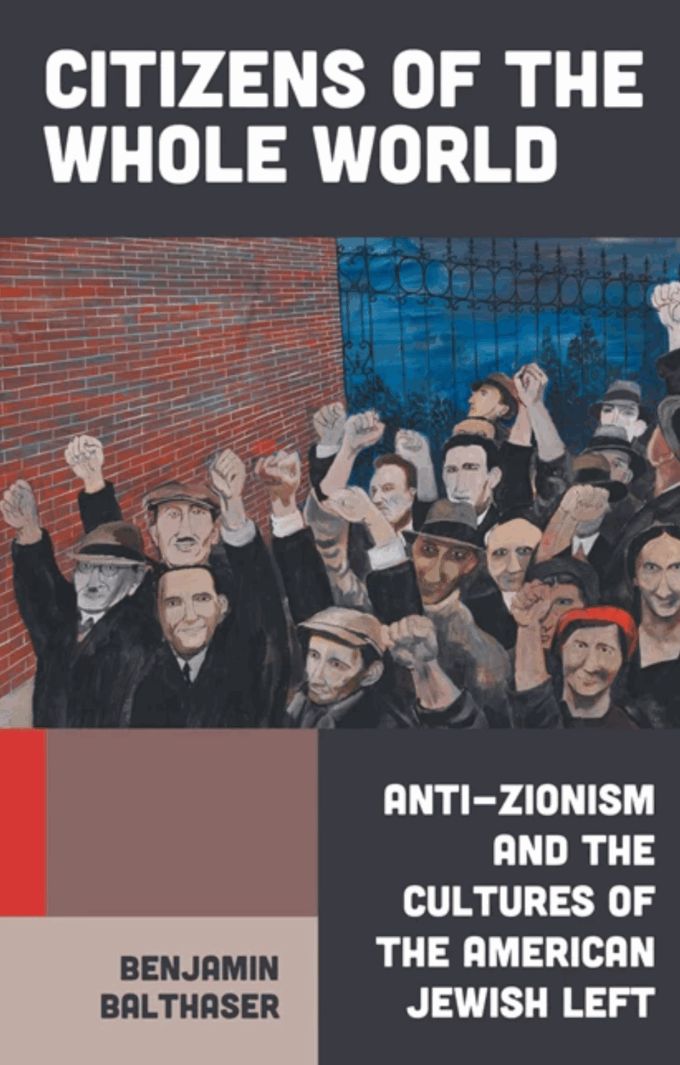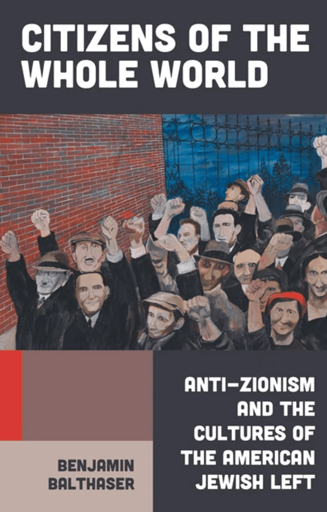Benjamin Balthaser teaches multi-ethnic U.S. literature at Indiana University in South Bend. He is the author of Citizens of the Whole World: Anti-Zionism and the Cultures of the American Jewish Left (Verso, 2025), in addition to articles and monographs that explore the intersections of race, social movements and the contours of U.S. empire. In Citizens, Balthaser explores a 100-year history of U.S. Jewish movements, and their self-definition through and against Zionism and U.S. empire. In this interview, exclusive for CounterPunch, he offers an interdisciplinary analysis of questions including diaspora, internationalism, Jewish identity, antisemitism, as well as his method which combines literature, oral history and archival sources.
Daniel Falcone: Could you explain how you structured the book in terms of the chapters and how themes like human rights, social movements, and identity construction are perhaps woven together?
Benjamin Balthaser: Citizens is not meant to be an encyclopedia of the Jewish left; my emphasis is on four key historical moments in which Jewish identity and anti-Zionist politics were both crucial, and also, in the process of being reimagined. The book is structured chronologically and thematically, as it moves among questions of anti-imperialism, identity, memory, and solidarity across social movements and a nearly 100 year history.
In Chapter 1, I focus on the Popular Front of the 1930s and ’40s, particularly Jews within the orbit of Communist and Trotskyist parties in the U.S., and for whom opposition to Zionism was part of their broader critique of fascism, colonialism and ethno-nationalism.
For both Chapters 2 and 3, I focus on the 1960s New Left, specifically on the relationship between anti-Zionism and critique of whiteness. From the 19th century to the mid-twentieth century, the exclusion of Jews from educational, housing, and ultimately immigration pathways complicated the idea that even Ashkenazi Jews were fully granted “whiteness.” By the 1960s, these legal barriers had mostly disappeared, and Jews had entered the middle class, into previously excluded universities and suburbs.
These chapters evolve to look at how Jewish activists, many of them key figures in the New Left, grappled with their new social position. Abbie Hoffman, interestingly, saw his Jewishness as a kind of “double identity,” assimilationist on the one hand, and yet also, part of a rebellious tradition, rooted in solidarity with the oppressed on the other. For such activists of the Jewish New Left, the Black Freedom Struggle, and its critique of Zionism, was central to how they articulated their politics and their rejection of at least the politics of whiteness.
Chapter 4 looks at the changing left of the 1970s, when a Zionism more or less solidified within the Jewish mainstream. This was also the era when identity politics was ascendant across many movements: Black Power, Chicano rights, feminism, etc. Some Jewish leftists formed socialist collectives, trying to reclaim Jewish identity in solidarity with the Panthers and radical feminism, resisting both compulsory Zionism and the white backlash of Jewish institutions like the ADL or AJC. The collectives were politically diverse — some were religious, others secular, but they shared a commitment to Jewish anti-racist, anti-imperialist values. Often, these tried to reconnect with earlier traditions, including Marxist movements like the Labor Bund, while also adapting to new social realities (like suburbanization and the loss of Jewish urban neighborhoods).
In Chapter 5, I turn to the present day to ask how groups like Jewish Voice for Peace and JFREJ (Jews for Racial and Economic Justice) navigate Jewish identity and cultural memory in the crater left after the collapse of a Zionist consensus, and the construction, particularly among the young and middle-to-working class, of a new anti-Zionist consensus. Some of these movements reinterpret Jewish religious traditions like Passover seders or Sukkot, others from socialist history and memory. These groups aren’t always distinct (members often overlap), but they represented a revival of Jewish left politics, grounded in both historical memory and/or religious re-inscription. So ultimately, my book puts together questions of identity, memory, and resistance thus showing how Jewish politics have been shaped through questions of anti-racism, capitalism, and empire. Right now, the task is reshaping a Jewish politics dedicated to the cause of anti-colonialism and support for the people of Palestine.
Daniel Falcone: Can you talk about how you connect literature to history and politics?
Benjamin Balthaser: I was trained in the field of cultural studies which begins with the assumption one cannot understand anything — literature, politics, history, in isolation. Traditional academic disciplines tended to separate knowledge into disconnected silos: art, literature, history, when of course, these fields are intimately connected. Cultural studies origins can be traced back to the Frankfurt School‘s interdisciplinary studies of fascism, and to New Left thinkers such as Stuart Hall, who wanted to understand power through complex social formations. To do such work it requires an understanding of social movements, changes in politics and identity, how people express themselves through art, ideas etc.
I don’t really mind how one describes my work. But I think what is important is to recognize how interdisciplinarity captures how people live, not simply as political or economic monads. This book focuses on the American Jewish left, so identity and politics are never separate from one another, nor from the structure of U.S. empire. This idea is further explored by scholars in American Studies like Janice Radway, Donald Pease, and Robin D.G. Kelley whose work suggests that our daily lives are formed within the context of empire, what William Appleman Williams referred to as “empire as a way of life.”
If one asks, “Is your work about Jewish identity, anti-Zionism, the left, or anti-imperialism?” The short answer is “all the above” because one cannot separate such questions. Anti-Zionism, for instance, is not just a political stance, it’s a way of expressing Jewish identity, and a critique of empire, and these identities and positions evolve together. Currently, we are seeing a crisis of American empire, of which the war on Palestine is one front. It has created a change in how Jewish identity is understood in the U.S., with the growing popularity of anti-Zionist groups such JVP (Jewish Voice for Peace) and the increasingly authoritarian tone of organizations such as ADL.
At the same time, we also witness a rise in white nationalism, yet another symptom of this imperial crisis: “white identity” movements are clearly a response to changing relations of U.S. power, declining standards of living, new forms of authoritarianism. This all affects how Jews see themselves within the U.S. Are Jews outsiders or insiders? Off-white? Hyper-white? Both? This has long been a complicated question in American life, and it’s being revisited now considering current political developments. Ultimately, I think literature, politics, and identity are tangled, and the fact is we can’t analyze one without studying the others.
Daniel Falcone: I noticed Zohran Mamdani’s campaign for mayor in NYC receiving intergenerational support among the politically left-leaning U.S. Jewish electorate. How does this phenomenon relate to the themes in your work?
Benjamin Balthaser: I like how you mention the Mamdani campaign brought together an intergenerational Jewish left coalition. One key intervention I’d like to offer is to un-tell the narration of Jewish generational rupture. There’s a long history of narrating Jewish migration to the U.S. through an assimilationist, teleological framework, in which the orthodox become liberal reform Jews; radical socialists become stalwart Democrats; everyone is always upwardly mobile. The most famous example is perhaps Alan Crosland’s The Jazz Singer (1927) in which we see a young man abandon his orthodox, reactionary parents to embrace showtunes, performance, and of course, the most American of all things, racial and racist masquerade.
This narrative is repeated regarding the New Left as well: younger Jewish radicals rebelling against their conservative parents. But from reading memoirs and conducting interviews, the story appears more complex: New Left Jews often felt they were fulfilling their parents, or sometimes grandparents, ethical and political commitments. Often, the younger generations aren’t actually breaking from tradition but reinterpreting and continuing one. In Mike Gold’s 1930 Jews without Money the main character learns from his mother’s working-class solidarity and her resistance to suburban assimilation. She passes down not a religion as an act of observance, but a political and ethical worldview grounded in social justice. Similarly, Grace Paley’s story Conversations with My Father (1974) explores this dynamic in which the daughter argues with her father – who does embrace upward mobility and assimilation – but never disowns him.
So, in looking at younger Jews today who are questioning Zionism or U.S. imperialism, I don’t necessarily see it as a break from longstanding Jewish tradition. On the contrary, it is often a return to earlier radical modalities of understanding and being. Before the 1970s Zionism wasn’t the consensus regarding American Jews. Many Jewish youths in the New Left were non-Zionist or anti-Zionist, and they often drew inspiration from older generations and radical grandparents, or Yiddish socialists, or anti-fascist activists.
In my second chapter, I interview a number of former members of Students for a Democratic Society (SDS), many of whom are still politically active today. One is a co-founder of my temple, Tzedek-Chicago. If there are throughlines from one historical moment to the next, it is both through the organizations people build and also, through continuities of left-wing commitment: diasporism, internationalism, anti-racism. Of course, I am not making a claim for all American Jews, but rather certain traditions of the left.
Today, when Zionists claims to speak for all Jews, there is a growing counter-voice reclaiming Jewish politics as rooted in anti-racism. That’s the tradition I see being revived in movements like JVP or campaigns like Mamdani’s.
The post American Jewish Radicalism and the American Empire appeared first on CounterPunch.org.
From CounterPunch.org via this RSS feed


